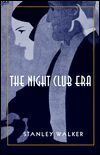The Night Club Era should rate as a Broadway Koran. Other books on the subject are unnecessary if they agree with it, wrong if they differ from it, and in either case should be burned."—Alva Johnston, from the Introduction
Written in the aftermath of Prohibition, Stanley Walker's The Night Club Era is a lively and idiosyncratic account of the people and places that defined New York's night life during the era of "the great American madness." Here we meet murderers and millionaires, gangsters, bartenders, celebrities of the stage, screen, and society, and a host of other colorful characters who...
The Night Club Era should rate as a Broadway Koran. Other books on the subject are unnecessary if they agree with it, wrong if they differ from it, and in either case should be burned."—Alva Johnston, from the Introduction
Written in the aftermath of Prohibition, Stanley Walker's The Night Club Era is a lively and idiosyncratic account of the people and places that defined New York's night life during the era of "the great American madness." Here we meet murderers and millionaires, gangsters, bartenders, celebrities of the stage, screen, and society, and a host of other colorful characters who populated the city's diverse night clubs, from El Fey to the Cotton Club. Walker relives the "night of incredulous sadness" on which the Volstead Act went into effect, visits a classic speakeasy, discussing the owner's delicate arrangements with policemen, prohibition agents, and bootleggers, and details the frequently brutal swindles practiced in the city's numerous clip joints and the tactics of the era's crime organizations, explaining precisely what happens when one is "taken for a ride."
Among the larger-than-life night club habitués Walker sketches are Owney Madden, the elder statesman of the city's rackets; Walter Winchell, America's most influential columnist and the "brash historian of our life and times"; Mayor James J. Walker, who typified the gaudiness, smartness, and insouciance of the city he ran, yet was never too refined to shoot dice on hotel room floors; and Texas Guinan, the beloved entertainer, hostess, and entrepreneur who greeted customers with her trademark phrase "Hello, sucker!" Vividly told, The Night Club Era offers a singular, serious—though never sober—history of New York City during Prohibition.






